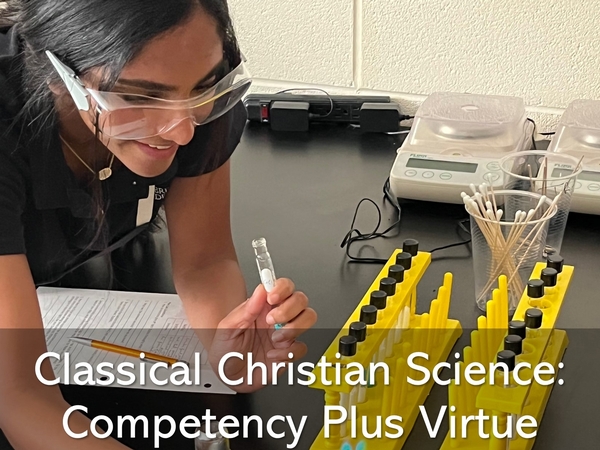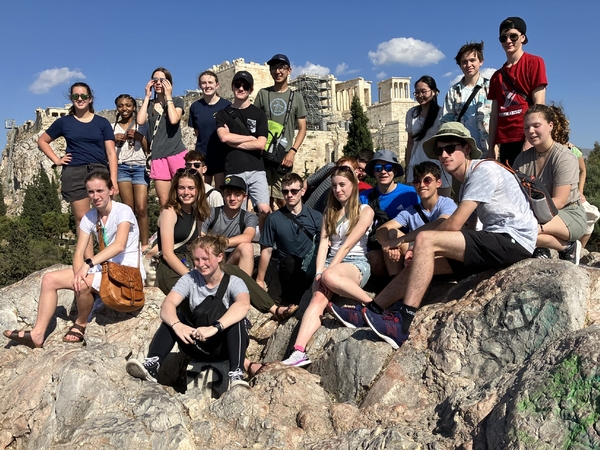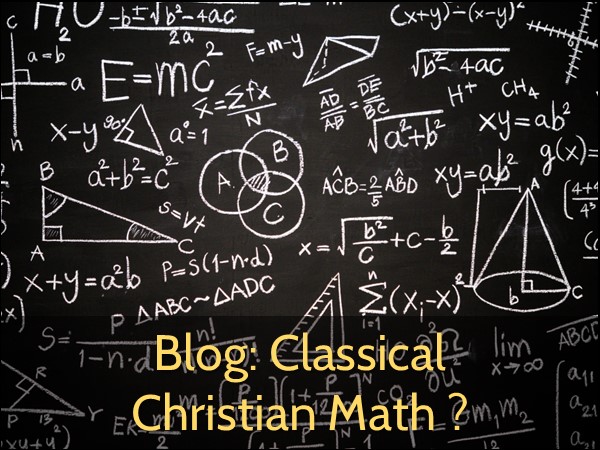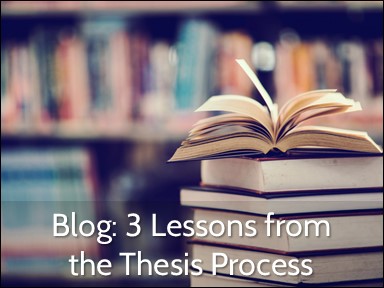Rockbridge Academy Blog
Classical Christian Science: Competency Plus Virtue

"Science is the search for the truth.”
– Linus Pauling, founder of Quantum Chemistry & Molecular Biology
Imagine a medical student memorizing cardiovascular system pathology for his licensing exam. Picture a pilot polishing up her landing skills in an aircraft simulator. Think of a teenage boy playing a car-racing video game. When does the medical student learn compassion for his patients? How does the pilot train for the courage that gives her a steady hand? Which game module teaches the adolescent driver good judgment? All three scenarios present a person who has trained for hours, weeks, or even years honing the skills necessary for their vocation; yet all three are missing elements essential to their roles. In contrast, a classical Christian education seeks to develop the whole person from competency to relationship to virtue. At Rockbridge, science classes are no exception.
Consider a scientist who has completed all the necessary education to be a leader in her field. She is familiar with cutting-edge research, and she has the analytical skills to design and build solutions. But in which class did she learn to appreciate the complexity of real-world problems? What research did she do on the ethics of her specialty? How much training has she had on written and oral communication to experts and decision-makers in the broader world? Modern scientists are trained to be competent, but lack preparation in interpersonal skills and moral character.
Science knowledge has exploded in the last century. The reflex response in education has been to cram more technical skills into the science classroom. In contrast, a liberal arts education is larger than the mere transmission of technical information. Modern classical science aims to combine practical knowledge with transformation of the social and personal aspects of a student’s character. As a classical Christian school, Rockbridge Academy pursues this transformation in light of biblical truths which develop the student as a bearer of the imago Dei.
In the dialectic years, students cultivate disciplined mental habits through systematic training in logic and Latin. As they move into rhetoric science, the focus shifts to developing habits in both computational and analogical thinking. While memorization and repetition are important, we eschew any method that limits learning to regurgitation of facts and algorithms in order to pass a test. Robust learning must be held in tension with contemplation, wonder, rest, and connection to the narrative of science, the story through which we see God’s incredible creation.
Do nothing from selfish ambition or conceit, but in humility count others as more significant than yourselves. Let each of you look not only to his own interests, but also to the interests of others.
– Philippians 2:3-4
The prevailing secular model for bright students seeking to make an impact on the world is a laser-like focus on areas of self-interest: grades, accolades, and individual accomplishments. As Rockbridge students build a foundation of scientific competency, we seek to create an environment which is truth-seeking for the benefit of the whole, not advantage-seeking for the benefit of the one. Rhetorical skills in speaking and writing are developed and used to teach and mentor others. Students are encouraged to ask questions about science and faith as they practice thinking deeply and putting difficult thoughts into words. They are led to see their developing abilities in the light of humility and stewardship: the humility of seeking truth rather than seeking rewards, and stewardship of the earth as we partner with God to be redeemers of culture and creation.
Foremost, our goal for the students at Rockbridge Academy is to guide their journey into full personhood. From the early days of grammar school until the final year of rhetoric, science students are encouraged to order their loves as they seek knowledge. We worship the Creator and have confidence in Him alone. We learn with boldness and purpose, not with fear of an unknown future. Our posture toward truth is one of awe as we see the Creator’s fingerprints on all of creation. We pray for students to leave these halls with every part of their education integrated into a whole, harmonious person: able to fulfill God’s call as stewards of creation, liberated in the freedom of Christ.
Robyn Kennedy has a degree in chemical engineering and a background in manufacturing and data acquisition systems. She teaches upper school science at Rockbridge Academy. Her husband is a retired Navy captain, and she and her family have served our country for many years at duty stations all over the world and around the country. She has four children and three of them are currently students at Rockbridge Academy.
5 Lessons I Learned on Grand Tour

It is the trip everyone looks forward to from kindergarten, the capstone of classical Christian education at Rockbridge Academy: Grand Tour. Grand Tour is a seventeen-day trek through some of the most historic places in Greece and Italy, where we spend nights in seven different hotels and a ferry, eat amazing food, and experience ruins, churches, museums, and breathtaking views. I'm grateful for the incredible experiences and learned valuable lessons along the way.
1. The priorities of man have not always been the same.
What a society creates says much about what they value. For instance, the Parthenon is a Greek temple in Athens whose construction began in 447 BC and is mostly still standing today. Clearly this temple was built to last. Many of the cathedrals, chapels, and basilicas we see in Italy are multiple centuries old and still in use today. We don’t have anything like that in the United States. In fact, we usually have the exact opposite. Our culture values efficiency, not longevity. We mass produce cookie-cutter houses in huge neighborhoods, get our coffee in cardboard cups without leaving our cars, and Amazon Prime just about everything. It is easy to forget that our priorities were not always the priorities of the past and still aren’t the priorities of people in other parts of the world. I went to restaurants where we ate dinner for three hours and saw buildings that are three times the age of our entire country. It was fascinating to step into another culture and experience their different values and priorities.
2. Man’s creations do not last forever.
Despite such an emphasis on longevity, it became abundantly clear that man’s creations do not last forever. Even with the impressive efforts of the ancient Greeks, there are extensive portions of the Parthenon missing and much of what we saw in Greece are now in ruins. The fact that any of these temples, villages, and buildings still exist in some capacity today is incredible. However, the ruined state of man’s labor serves as a humbling reminder of man’s limitations. The fallen pillars and marred stones stand in stark contrast to the giant mountains in Delphi, clear water on the Gulf of Corinth, and beautiful countryside in Assisi, all of which remain majestic and unscathed. This is God’s creation, utterly immovable and long lasting, and it is far greater than anything man could dream up himself.
3. All of man’s creation points to the ultimate Creator.
Although man’s creations are unimpressive beside God’s majestic work, we continue to create. It would be absurd to assume that anything man makes is entirely from his own volition and ideas. All that is in this world was inspired by God and is under His dominion. This being the case, everything we create points to the ultimate Creator. This fact was incredibly evident on Grand Tour. Greece’s many ruined temples are evidence of the emphasis placed on a supreme being, and the art and architecture of the Enlightenment is steeped in religion. One can not walk out of the Borghese Gallery without at least contemplating a higher power. The way Saint Peter’s Basilica constantly drew my eyes heavenward or the way Michelangelo's sculptures celebrated God’s greatest creation reminded me of the one whom we all will ultimately glorify. Creating is a gift unique to mankind, and it is a gift that magnifies the true Creator.
4. “All are from the dust, and to dust all return” (Ecclesiastes 3:20).
Possibly my favorite site we visited on Grand Tour was the Catacombs. The Catacombs of San Callisto is an ancient burial site in Rome where approximately five hundred thousand Christians were buried. We were able to descend into the Catacombs, walk through a few of many passageways, and see now empty graves and burial chambers which used to hold ordinary Christians as well as popes and martyrs. At one point along the way, I saw a glass case that held the disintegrated remains of a boy who had been buried in the Catacombs. What had once been a walking and talking human like me was reduced to powder, and all I could think of was that verse from Eccesiastes: “all are from dust, and to dust all return,” (Ecc 3:20). In Genesis 2, God created the first man out of dust from the ground and breathed life into him. It was a quieting experience to walk where my brothers and sisters in Christ had once laid their dead and remember that even the bodies of God’s people will one day return to the ground. However, it was also a joyful reminder of God’s grace and faithfulness that the dust of our bodies is not the end of our lives, but rather the beginning of our soul’s eternity with Him.
5. Beauty is essential.
If you go on Grand Tour and your jaw does not drop at least once a day, you are missing something. Beauty is everywhere, but it is incredibly evident on this trip. It was present in the Grecian countryside, in the main temple ruins, in the middle of the Adriatic sea, and in every painting, church, and sculpture. As we began to see these churches, I wondered about the morality of putting so much money and resources simply into making something beautiful. After all, Christians can worship God in a hole in the ground just as well as they can in the Sistine Chapel. However, the further along we got, the more convinced I was of the importance of beauty. I will not pretend to know the motives behind all of the beautiful churches, paintings, and sculptures we saw, but I can speak to the reaction they evoked. I and those around me were continually in awe. The beauty of these places created an environment that demanded reverence. Yet, for me, it was never toward the beautiful thing itself or the man who made it, it was always for a God who allows beauty such as this to exist. Man was created to marvel, and it seems that proper beauty evokes its siblings, goodness and truth, in such a manner that makes our God simply undeniable.
I could not be more grateful for the opportunity God has given me to go on this trip and learn these lessons along with many others. Grand Tour is a time to learn: learn about yourself, learn about your classmates, learn about God, and learn about His majestic creation. Grand Tour is truly unique, and its blessings are beyond words. I look forward to seeing what future Rockbridge students learn in Europe!
Olivia Reardon, ‘22, is attending Messiah University where she continues to pursue her passion for reading, writing, teaching, and dance. While she loves learning, quality time, and ice cream, she is particularly passionate about serving Christ in all that she does and says.
Classical Christian Math?

If you look up the course offerings at my local public high school, you’ll notice some stark differences between their classes and those offered here at Rockbridge Academy. Instead of Literature of Antiquity, you’ll see English 11. Instead of theology courses like Bibliology and Hermeneutics, you’ll find Honors Comparative Religions. I think it’s probably safe to say that Rockbridge will never offer Business of Fashion. I’m equally sure that, were the roles reversed, someone looking at our course catalog would wonder what in the world Great Ideas I and II are all about!
Despite these obvious differences, there is one area where our course catalogues are quite similar; in fact, every single class we offer in this discipline is also taught at my local public school under the exact same name. I’m speaking, of course, of mathematics. You can find all our classes, from Pre-Algebra to Calculus, at any middle or high school down the street from you.
Does this mean that a public-school math class and a Rockbridge math class are the same? They have the exact same name after all!
The answer is a resounding no!
To be sure, there are many similarities between Rockbridge math classes and public-school math classes. The math concepts themselves do not change of course, and we all want students to be proficient in problem solving and successful in any future mathematical endeavors.
These similarities are far from the whole story, however. There are many differences between Rockbridge math classes and those in other educational settings. These differences arise because we do not have the same educational paradigm. Rockbridge teaches math from a classical, Christian perspective; other educational institutions do not.
What does this look like? Both pieces, classical and Christian, profoundly affect the way Rockbridge math teachers teach our classes.
To teach math classically has many components. First, there is an emphasis on conceptual understanding and eloquent expression of that understanding. We want our students to deeply grasp the concepts they are learning. We do not merely want them to know how to solve a particular problem; we also want them to understand the mathematical principles at play in that problem. Furthermore, we want them to express their understanding in an eloquent way. This occurs through informal class discussion, where students consistently use technical math vocabulary, and through formal assessments such as oral presentations and essay questions. (Yes–you read that right–there are essay questions on our math tests!) Putting an idea into words is an excellent metric to judge true understanding, and we require this often in our math classes.
A second aspect of classical mathematics is an emphasis on history and historical context. We try to give our students a sense of where each concept falls in math history and discuss the important mathematicians who contributed the ideas, as well as where they fit into the larger context of world history. While we are not having daily history lessons (our class time is focused on mathematical content proper!), providing historical context whenever possible is a key component of classical mathematics classes.
A third element of classical mathematics is an emphasis on the integration of ideas, both within our classes and with the rest of the curriculum. Mathematics is an internally consistent body of knowledge, and we want our students to see how each concept they are learning integrates into one cohesive whole. We also want our students to see how mathematics is integrated with the rest of the curriculum. The most obvious point of integration is with science, which uses math as a language to model natural phenomena. While this is the clearest place for integration, it is far from the only place! Mathematics teaches us about aesthetics, much of its vocabulary has Latin roots, it has its own history as I mentioned above, and it engenders many interesting philosophical discussions.
Mathematics can even tell us about theology, or, more properly, theology can tell us a lot about mathematics. This leads us to the Christian component of a classical, Christian math classroom. We believe and teach our students that studying math gives us a glimpse into the mind of the Creator. The consistency, orderliness, logic, and creativity of God are all reflected in math, and in a world where relativism is the ideology of the day, math provides a picture of the objectivity and certainty of God’s Word. By studying math, students learn about the character and goodness of God. Ultimately, mathematics class is an opportunity to worship the creator of mathematics.
We certainly hope each of our students learns a lot of math concepts, expresses them clearly, understands the historical context, and can integrate ideas inside and outside the mathematics curriculum. We hope most of all, however, that our students walk away filled with wonder for our great Creator.
While there are many excellent math classes at schools of all kinds across the country where students build conceptual understanding, hone problem-solving skills, and become equipped for future callings, only in a classical, Christian math class do students get an excellent mathematical education from an explicitly Christian worldview.
So do not be fooled by the fact that our classes have the same name. The classical, Christian math classes at Rockbridge Academy are significantly different from the math classes at the local public school. And we math teachers wouldn’t have it any other way!
Monica Davis has taught all manner of 10th through 12th grade math classes at Rockbridge Academy for the last 9 years. When she is not delighting in math with her students, she enjoys cooking, baking, going for walks, and spending time with friends and family, especially her baby Theo and husband Josh, who is a Rockbridge Academy alumnus from the Class of 2004.
Three Lessons from the Thesis Process

When people asked me “What do you teach?”, I would sometimes say, “A research, writing, and speech class for juniors and seniors. It’s called ‘rhetoric.’” But it is more than that: rhetoric is a capstone of a liberal arts education, and success is measured less in information or skills students acquire (research, writing, speech) than in the kind of people students become. Don’t misunderstand me—we cover a lot of information in rhetoric, from the sonnet structure to the power of MLK Jr.’s “Letter from Birmingham Jail”. . . . But the core of a liberal arts education is for students to become self-disciplined, independent learners who can serve the world with their wisdom. The junior and senior thesis projects are opportunities for students to do just that.
First, the thesis is an exercise in self-discipline. The final product does not come about in a day’s work. Students must determine a worthwhile topic, develop a feasible research question, track down trusted resources, understand experts on all sides, glean pertinent evidence, develop their own ideas, organize their thoughts into an outline, articulate their argument in clear writing, turn their written argument into a compelling speech, present their argument before an audience, and answer that audience’s questions. Don’t worry—we lay out many, many checkpoints, with feedback and instruction along the way. But the ability to accomplish such a project takes practice (part of the reason for including both a junior and a senior thesis in the curriculum), and students who try to track down the necessary sources the night before the note cards are due learn the pain of procrastination.
Second, the thesis is an exercise in independent study. I frequently tell my students that my goal is to work myself out of a job, meaning that I want them to no longer need a teacher in order to learn whatever they want. Students of a liberal arts education should be prepared to tackle the topics that come their way, and the thesis projects are an opportunity for students to put their ability to the test. From nuclear energy to separation of church and state, from embryonic stem-cell research to the value of fairy tales, the thesis topics are as varied as the students’ interests. The thesis shows they have the skills to be lifelong learners, coming to biblically-grounded conclusions with less and less direction from a teacher.
Finally, the thesis is an exercise in sharing ideas with an audience. Over the years, I have been inspired by lines from Rudyard Kipling’s poem “IF”: “If you can talk with crowds and keep your virtue, / Or walk with Kings—nor lose the common touch, . . . / Yours is the Earth and everything that’s in it, / And—which is more—you’ll be a Man, my son!” I want my students to be able to speak before both kings and commoners with virtue and clarity. The Apostle Paul gives a biblical model of this in his own ministry and charges us in Ephesians 4 to use our skills to build up the body of Christ. I know I have been built up by listening to many thesis presentations from my students. They have done the hard work of thinking and writing, and at the end of the year they have shared their work with others through public presentations.
The rhetoric work of Rockbridge students has frequently reached a wider audience through speech competitions such as the Rotary Club 4-Way Test speech competition, the VFW Voice of Democracy competition, and the Association of Classical Christian Schools Chrysostom Oratory competition. These audiences have recognized the excellence of our students’ work on a state and national level. Many students, though, celebrate triumphs that never gain accolades at award ceremonies—persevering through an apparent dead-end in research, finding the perfect phrasing for a sentence, and learning to listen to classmates who disagree and to seek biblical unity on difficult issues.
In his small book The Idea of a Christian College, Arthur F. Holmes captures part of my aim in teaching: “To teach a person to read and to write is to teach him to think for himself, to develop more fully the possession of his God-given powers” (p. 31). In some sense, I am still teaching students to read and write. They are simply reading academic journals and writing a 20-page persuasive essay. But in response to “What do you teach?” maybe I should say, “I am helping students develop their God-given powers,” and I’ve found the thesis to be a helpful tool towards that end.
Emily Scheie is a teacher who is grateful to share the joy of learning with her students. Outside the classroom, you might find her coaching cross country, taking graduate classes in linguistics, or reading for book club (with a mug of tea in hand). She is a sister to six siblings and three siblings-in-law and is an aunt to a growing number of nieces and nephews. She worships and serves with Redeemer Anglican Church in Annapolis and believes, in the words of the poet Gerard Manley Hopkins, “The world is charged with the grandeur of God.”

I just read your text about Classical Christian Math and I found it really interesting.
I am a mathematician who has only taught university courses but I have always thought about how I would want my chidren (which I hope to have soon) to learn Math in a way which made them really appreciate all the effort our ancestors have done to get us here and also to see how the glory o God manifests itself through Math.
Your text gave me a very nice perspective on how to approach the topic when the time to educate my children in Math comes.
Regards
Daniel Souza